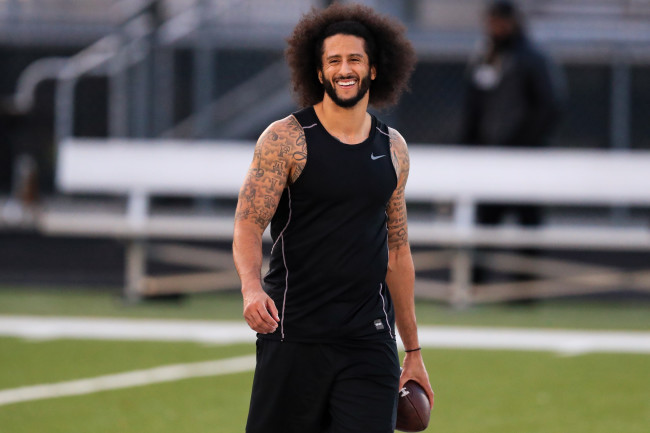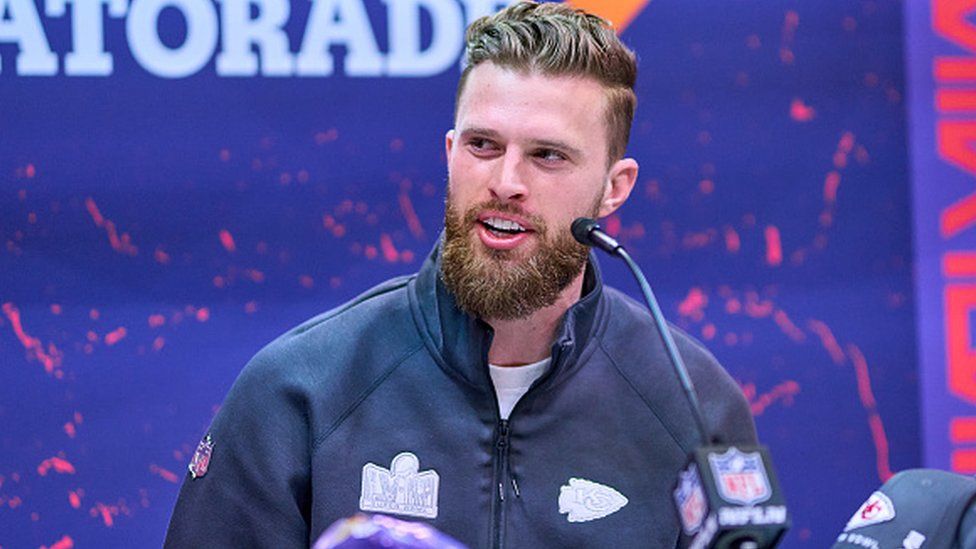NFL fans are voicing concerns over what they perceive as a double standard in the league’s responses to different forms of player self-expression. The spotlight is currently on Kansas City Chiefs kicker Harrison Butker and former San Francisco 49ers quarterback Colin Kaepernick, with critics drawing stark contrasts between the NFL’s reactions to each.

Earlier this month, Butker drew national attention for his controversial remarks during a commencement speech at Benedictine College. As the commencement speaker, Butker condemned abortion rights, Pride Month, and Diversity, Equity, and Inclusion (DEI) initiatives. He also encouraged female graduates to embrace the “vocation” of homemaker. This speech quickly sparked widespread backlash, prompting the NFL to distance itself from Butker’s comments, emphasizing that they were made in his personal capacity and did not reflect the league’s views.
“The NFL is steadfast in our commitment to inclusion, which only makes our league stronger,” read a statement from the league. NFL Commissioner Roger Goodell added, “We have over 3,000 players. We have executives around the league that have a diversity of opinions and thoughts just like America does. I think that’s something that we treasure, and that’s part of, I think, ultimately what makes us as a society better.”

However, several social media users were quick to highlight what they saw as hypocrisy in Goodell’s handling of Butker’s remarks compared to his response to Kaepernick’s protest. In 2016, Kaepernick began kneeling during the national anthem to protest racial injustices in America. Goodell’s initial public comments on Kaepernick’s form of protest were critical, emphasizing the need for “respectful” methods of enacting societal change.
“I think it’s important if they see things they want to change in society, and clearly we have things that can get better in society, and we should get better,” Goodell said at the time. “But we have to choose respectful ways of doing that so that we can achieve the outcomes we ultimately want and do it with the values and ideals that make our country great.”
As Kaepernick’s movement gained momentum, with more players joining in, Goodell directed NFL teams that “everyone should stand” during the national anthem. He noted that the anthem controversy was hindering honest conversations and real progress on the underlying issues, expressing a desire to move past the controversy together with the players.
/cdn.vox-cdn.com/uploads/chorus_image/image/65716329/1182910294.jpg.0.jpg)
Despite opting out of his contract with the 49ers in 2017, Kaepernick has remained unsigned by any NFL team. Many believe that his political views led to his being blacklisted by team owners. In the summer of 2020, amid a national reckoning on racial issues, Goodell released a statement acknowledging the league’s past failures in addressing racism and listening to players.
“We, the National Football League admit we were wrong for not listening to NFL players earlier and encourage all to speak out and peacefully protest,” Goodell said.
The disparity in Goodell’s reactions to Kaepernick and Butker has not gone unnoticed. Critics argue that the NFL’s commitment to inclusion and diversity appears inconsistent, pointing to the league’s more lenient stance on Butker’s controversial speech compared to its handling of Kaepernick’s peaceful protests. Social media is rife with comments highlighting this perceived double standard, reflecting a broader frustration with the league’s approach to player activism and expression.
As the NFL continues to navigate its complex landscape of player expression and social issues, the calls for a more consistent and equitable approach grow louder. The contrasting cases of Butker and Kaepernick underscore the ongoing challenges the league faces in balancing its public image, player autonomy, and commitment to social justice.
News
Celine Dion and Lady Gaga IGNORE Meghan on stage at the 2024 Olympic Games: ‘WE DO NOT WANT A SCRIPTED RELATIONSHIP’
Celine Dion and Lady Gaga Humiliate Meghan Markle During 2024 Olympics Opening Ceremony During the 2024 Olympic opening ceremony, Celine Dion and Lady Gaga publicly criticized Meghan Markle, calling her a “grifter” and igniting intense controversy. Their performance, intended to…
Carole Malone FRENCH: ‘Don’t think of yourself as a hero if you’re just blaming others’. Harry’s claim that tabloids caused a rift between him and RF was exposed by Carole Malone
Prince Harry has once again become a lightning rod for controversy following his latest appearance in an ITV documentary detailing his legal battle against tabloid newspapers. The documentary sheds light on the Duke of Sussex’s recent victory against Mirror Group…
UPDATE: Prince William removing Queen Camilla’s sister from THE ROYAL PAYROLL after two decades
Prince William has decided not to renew the contract of Annabel Elliot, Queen Camilla’s sister, as the interior designer for the Duchy of Cornwall, according to the recently released Integrated Annual Report of the royal family’s historic estate. This decision…
Harry MAKES RIDICULOUS ‘STORIES’ about Queen Elizabeth in new ITV documentary
A new ITV documentary featuring Prince Harry has sparked significant controversy, as it makes bold claims about his relationship with the late Queen Elizabeth II and Princess Diana. The documentary, which premiered on Thursday, has reportedly caused a stir within…
Prince Harry ‘RUSHLY LOOKING FOR ANSWERS’ from RF. Through latest statement on challenging Invictus Games
King Charles III faces a moral dilemma after Prince Harry announced he will bring his biggest project to England in 2027, as revealed on a British morning show. On Tuesday, Harry announced that the eighth Invictus Games veterans event will…
Prince Harry admits to ‘CENTRAL PIECE’ in split between him and RF
Prince Harry has revealed that the intense and prolonged battle with British tabloids was a key factor in the rift between him and the royal family. In a recent interview on ITV, Harry spoke candidly about the impact of his…
End of content
No more pages to load










